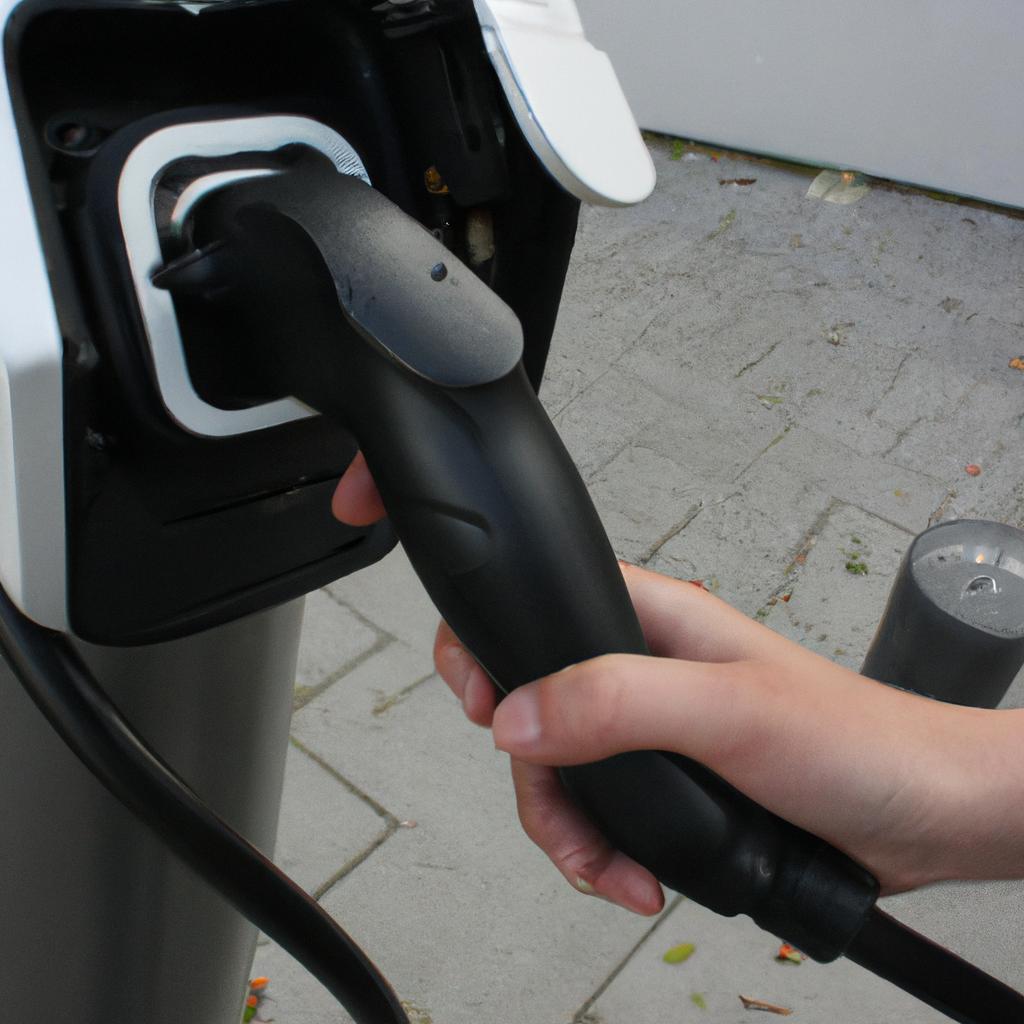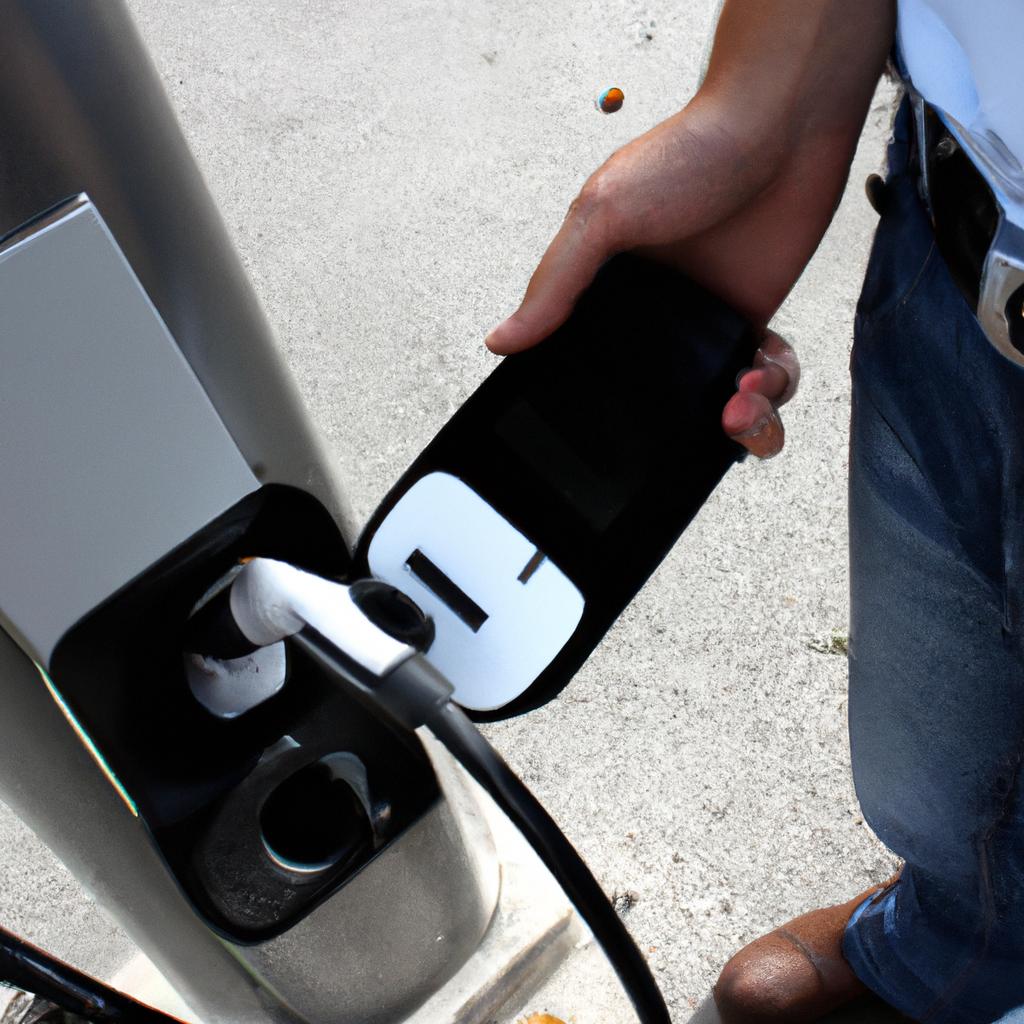The widespread adoption of electric vehicles (EVs) has led to an increased demand for efficient and reliable charging infrastructure. As the number of EVs on the roads continues to grow, it is crucial to develop smart charging solutions that can effectively manage electricity distribution and optimize charging processes. This article explores the concept of smart charging and its potential in advancing the EV charging infrastructure.
To illustrate the significance of smart charging, consider the following hypothetical scenario: It is a cold winter morning, and hundreds of EV owners across a city are preparing for their daily commute. They all need to charge their vehicles simultaneously before heading out, putting immense strain on the local power grid. Without proper management, this sudden surge in electricity demand could lead to blackouts or overloading issues. However, with smart charging technology in place, each vehicle’s charger would communicate with a central system that manages energy distribution based on factors such as current capacity, time-of-use pricing, and individual users’ preferences. By intelligently scheduling charges and allocating resources efficiently, smart charging systems can ensure a smooth flow of electricity without compromising reliability or stability.
The Need for Smart Charging
Electric vehicles (EVs) have gained significant traction in recent years as a sustainable alternative to traditional internal combustion engine vehicles. However, the widespread adoption of EVs poses several challenges that need to be addressed. One such challenge is the development and implementation of an advanced charging infrastructure capable of supporting the growing number of EVs on the road.
To illustrate this point, let us consider a hypothetical scenario where a city experiences a sudden surge in the number of electric vehicles being used by its residents. As more people switch to EVs, there arises a need for sufficient charging stations throughout the city to cater to their charging requirements. Inadequate infrastructure can lead to long waiting times and inconvenience for EV owners, discouraging further adoption of these eco-friendly vehicles.
In response to these challenges, smart charging technology has emerged as a promising solution. By integrating intelligent features into the charging process, smart charging systems optimize energy usage, minimize grid stress during peak hours, and enhance user experience. These systems utilize real-time data analysis algorithms and communication capabilities to ensure efficient utilization of available resources while meeting individual vehicle owner’s needs.
To convey the significance and potential impact of smart charging systems more effectively, consider the following bullet points:
- Enhanced User Convenience: With smart charging infrastructure in place, users can remotely monitor their vehicle’s battery status and schedule charges based on their daily routines or electricity tariff rates.
- Grid Optimization: Smart chargers intelligently manage power demand from multiple EVs connected simultaneously, preventing overloading and reducing strain on the electrical grid.
- Renewable Energy Integration: By leveraging real-time weather forecasts and optimizing charge schedules accordingly, smart chargers facilitate increased integration of renewable energy sources into the grid.
- Cost Reduction: Through dynamic pricing models tied with time-of-use tariffs or demand response programs, users benefit from cost savings while utility providers balance load distribution efficiently.
Furthermore, it is important to highlight the advantages of smart charging systems in a concise table format:
| Benefits of Smart Charging |
|---|
| Efficient energy utilization |
| Reduced peak demand on the grid |
| Enhanced renewable energy integration |
| Cost savings for users |
In conclusion, the growing adoption of electric vehicles necessitates an advanced and intelligent charging infrastructure. The implementation of smart charging systems offers numerous benefits such as enhanced user convenience, optimized grid performance, increased renewable energy integration, and cost reduction. In the subsequent section, we will explore these benefits in detail.
Next, let us dive into the various advantages offered by smart charging technology.
Benefits of Smart Charging
Advancements in technology have paved the way for smart charging solutions that address the challenges faced by electric vehicle (EV) owners. These solutions not only prioritize convenience and efficiency but also contribute to the overall development of a robust EV charging infrastructure. To better understand the implications of smart charging, let us explore some notable benefits it offers.
One real-world example that illustrates the advantages of smart charging is the implementation of dynamic pricing mechanisms in public EV charging stations. By employing time-of-use rates, where electricity costs vary based on demand throughout the day, users are incentivized to charge their vehicles during off-peak hours when energy prices are lower. This approach promotes load balancing and reduces strain on power grids during peak consumption periods, resulting in more stable and reliable energy supply.
To further highlight the potential impact of smart charging, consider these key benefits:
- Optimal resource allocation: Smart charging systems enable efficient utilization of available resources by dynamically distributing charging loads across multiple stations. This ensures equitable access to charging infrastructure while minimizing congestion at specific locations.
- Enhanced grid integration: Through bidirectional communication capabilities, smart chargers can facilitate effective integration with renewable energy sources and storage systems. This synergy allows for greater flexibility in managing fluctuations in electricity generation from renewable sources and supports grid stability.
- Grid support services: Smart chargers can provide ancillary services to assist utility operators in maintaining grid reliability and stability. For instance, they can participate in demand response programs or operate as virtual power plants during times of high demand or grid emergencies.
- User-centric experience: With features like smartphone applications and remote monitoring, smart charging enhances user control and convenience. Users can easily locate nearby charging points, check availability status, make reservations if needed, monitor their vehicle’s state of charge remotely, and even receive notifications about optimal charging times.
The significance of these benefits becomes apparent when considering the rising adoption rate of electric vehicles worldwide. As governments encourage greener transportation options through incentives and regulations, the demand for efficient charging infrastructure will continue to grow. In the subsequent section on “Smart Charging Technologies,” we delve deeper into the various technologies that enable these advantages and explore their implementation across different contexts.
Smart Charging Technologies
Advancements in smart charging technology have revolutionized the electric vehicle (EV) charging infrastructure, enabling more efficient and convenient charging experiences for EV owners. By utilizing data-driven insights and intelligent algorithms, smart charging systems optimize various aspects of the charging process, ensuring improved energy management and grid stability.
To illustrate the potential benefits of smart charging, let us consider a hypothetical scenario where an urban area has a high concentration of EVs but limited charging infrastructure. Without smart charging, this situation could lead to peak demand surges during specific hours when most drivers return home from work and plug in their vehicles simultaneously. This sudden increase in energy consumption could strain the local power grid, potentially causing blackouts or requiring costly upgrades to accommodate the additional load. However, with the implementation of smart charging technologies, such as dynamic pricing and demand response programs, these challenges can be mitigated effectively.
The advantages of incorporating smart charging into the EV ecosystem are manifold:
- Grid optimization: Smart chargers can communicate with each other and adjust their charging rates based on real-time grid conditions. By distributing electricity usage over non-peak hours or balancing loads across different areas, smart chargers help prevent grid overload.
- Cost savings: Dynamic pricing models allow EV owners to take advantage of cheaper electricity rates during off-peak periods. This not only incentivizes users to charge their vehicles at optimal times but also helps reduce overall electricity costs.
- Renewable integration: Smart chargers can facilitate increased adoption of renewable energy sources by coordinating EV charging patterns with renewable energy generation peaks. This alignment ensures that clean energy is efficiently utilized while reducing reliance on fossil fuels.
- Energy storage utilization: Integrating energy storage solutions like batteries with smart chargers enables surplus electricity generated from renewables to be stored for later use during peak demand periods.
By harnessing the capabilities offered by smart charging technologies, society can transition towards a sustainable transportation future characterized by reduced carbon emissions and enhanced grid reliability.
Table 1: Benefits of Smart Charging
| Benefit | Description |
|---|---|
| Grid optimization | Distributing electricity usage over non-peak hours and balancing loads to prevent grid overload. |
| Cost savings | Taking advantage of cheaper off-peak electricity rates, reducing overall charging costs. |
| Renewable integration | Coordinating EV charging with renewable energy generation peaks, promoting clean energy adoption. |
| Energy storage utilization | Storing surplus renewable energy for later use during peak demand periods. |
In the subsequent section on the “Integration of Renewable Energy Sources,” we will explore how smart charging can support the seamless incorporation of renewables into the electric grid infrastructure while meeting transportation needs effectively.
Integration of Renewable Energy Sources
Smart Charging: Advancing Electric Vehicle Charging Infrastructure
Building upon the advancements in smart charging technologies, the integration of renewable energy sources holds great potential for further enhancing electric vehicle (EV) charging infrastructure. To illustrate this, let us consider a hypothetical scenario where an urban area is powered by a combination of solar and wind energy. The excess electricity generated during peak hours can be utilized to charge EVs efficiently, reducing dependence on fossil fuels and promoting sustainable transportation.
The integration of renewable energy sources into EV charging infrastructure brings several benefits that contribute to its advancement:
-
Environmental Sustainability: By utilizing renewable energy sources such as solar or wind power for EV charging, carbon emissions associated with conventional power generation methods are significantly reduced. This promotes a cleaner environment and supports global efforts towards mitigating climate change.
-
Cost Effectiveness: Incorporating renewables into the charging infrastructure offers long-term cost benefits. As the price of renewable technologies continues to decrease, harnessing clean energy becomes more economically viable compared to traditional grid-based electricity sourcing methods.
-
Energy Grid Optimization: Smart charging systems integrated with renewable energy sources allow for better management and optimization of the overall energy grid. Through real-time monitoring and data analysis, these systems can balance demand and supply effectively, ensuring efficient utilization of available resources.
-
Resilience and Independence: Dependence on centralized power grids can leave communities vulnerable to blackouts or disruptions in service due to natural disasters or accidents. Integrating renewables into EV charging infrastructure helps decentralize power generation, making communities more resilient and less reliant on external sources in times of emergencies.
Table 1 below provides a comparison between conventional grid-based charging systems and smart charging systems integrated with renewable energy sources:
| Conventional Grid-Based Charging Systems | Smart Charging Systems Integrated with Renewable Energy Sources | |
|---|---|---|
| Carbon Emissions | High | Low |
| Long-Term Costs | Potentially high | Lower |
| Grid Optimization | Limited | Improved |
| Energy Resilience | Susceptible | Enhanced |
By integrating renewable energy sources into EV charging infrastructure, we can move towards a more sustainable and resilient future. In the subsequent section on “Smart Charging and Grid Management,” we will explore how smart charging technologies contribute to effective grid management, further enhancing the benefits of electric vehicle adoption.
Smart Charging and Grid Management
Advancements in electric vehicle (EV) charging infrastructure have become crucial for the widespread adoption of EVs. One key aspect of this advancement is the integration of renewable energy sources, which not only promotes sustainability but also enhances the overall efficiency and reliability of the charging process. Building on this integration, smart charging technologies are emerging as a promising solution to effectively manage grid resources and optimize EV charging operations.
To illustrate the potential benefits of smart charging, consider a hypothetical scenario where an urban area experiences high demand for EV charging during peak hours. Without proper management strategies, this surge in demand could strain the electrical grid and lead to increased electricity costs or even power outages. However, by implementing smart charging systems that intelligently prioritize and distribute available energy resources, it becomes possible to mitigate these challenges.
One important feature of smart charging is its ability to actively respond to real-time conditions within the electrical grid. Through advanced communication networks and data analytics, these systems can dynamically adjust charging rates based on factors such as electricity prices, grid congestion levels, and availability of renewable energy. This flexibility enables optimal utilization of existing grid capacity while reducing reliance on conventional fossil fuel-based power generation.
- Decreased greenhouse gas emissions due to increased use of renewable energy
- Cost savings through off-peak pricing incentives
- Enhanced reliability by avoiding overloading the grid infrastructure
- Contribution towards achieving climate change mitigation goals
Furthermore, visualizing the potential impact of smart charging can be achieved through a table highlighting various aspects:
| Benefits | Description |
|---|---|
| Environmental Sustainability | Integration with renewable energy sources reduces carbon footprint |
| Economic Savings | Off-peak pricing incentivizes lower-cost charging |
| Grid Stability | Avoiding excessive demand can prevent grid overload and power outages |
| Climate Change Mitigation | Smart charging aligns with global efforts to reduce greenhouse gas emissions |
In conclusion, the integration of renewable energy sources paves the way for smart charging technologies to optimize EV charging infrastructure. By actively responding to real-time conditions within the electrical grid, these systems provide efficient resource allocation while promoting sustainability and reliability.
Future Implications of Smart Charging
Smart Charging: Advancing Electric Vehicle Charging Infrastructure
Transitioning seamlessly from the previous section on “Smart Charging and Grid Management,” this section delves into the future implications of smart charging technologies. To illustrate its potential, let us consider a hypothetical scenario: imagine a busy urban area where electric vehicles (EVs) are becoming increasingly popular among residents. The existing charging infrastructure struggles to meet the growing demand, leading to long waiting times and frustration among EV owners. However, with the implementation of smart charging systems, these challenges can be addressed effectively.
One significant advantage of smart charging is its ability to optimize energy usage in real-time. By utilizing advanced algorithms and data analysis techniques, smart chargers can determine the most efficient time for each vehicle to charge based on factors such as electricity prices, grid load, and individual user preferences. This optimization not only ensures that EVs receive power when needed but also reduces strain on the electrical grid during peak hours. As a result, both EV owners and utility companies benefit from improved efficiency and reduced costs.
Furthermore, smart charging systems enable bidirectional power flow between EVs and the grid through vehicle-to-grid (V2G) technology. With V2G integration, EV batteries can serve as distributed energy resources that contribute to grid stability by supplying stored electricity during periods of high demand or supporting renewable energy generation by feeding excess energy back into the system. This capability enhances overall grid resilience while providing additional revenue streams for EV owners who participate in demand response programs.
To emphasize the societal benefits of advancing electric vehicle charging infrastructure through smart charging technologies, consider the following emotional bullet points:
- Reduced air pollution levels due to increased adoption of zero-emission electric vehicles.
- Improved public health outcomes resulting from decreased reliance on fossil fuel-powered transportation.
- Enhanced energy independence by reducing dependence on imported oil.
- Increased job opportunities within emerging sectors associated with electric mobility solutions.
In addition to these compelling advantages, it is important to highlight the potential impact of smart charging on various stakeholders. The table below presents a comparative analysis:
| Stakeholder | Traditional Charging Infrastructure | Smart Charging Infrastructure |
|---|---|---|
| EV Owners | Long waiting times | Reduced charging time |
| Utility Companies | Difficulty managing peak loads | Enhanced grid management |
| Governments | Limited control over electricity demand | Improved energy efficiency |
In conclusion, the future implications of smart charging are promising for electric vehicle owners, utility companies, and governments alike. Through optimization algorithms and V2G technology, smart chargers can address current challenges in charging infrastructure while providing numerous benefits such as improved grid management, reduced waiting times for EV owners, and additional revenue streams. Moreover, embracing smart charging initiatives has broader societal advantages by reducing pollution levels, promoting public health, increasing energy independence, and creating employment opportunities. As we move forward into an increasingly electrified transportation era, investing in advanced charging solutions will be crucial for sustainable mobility worldwide.
 Sfeva
Sfeva


